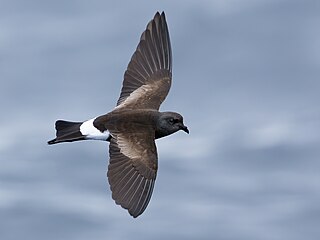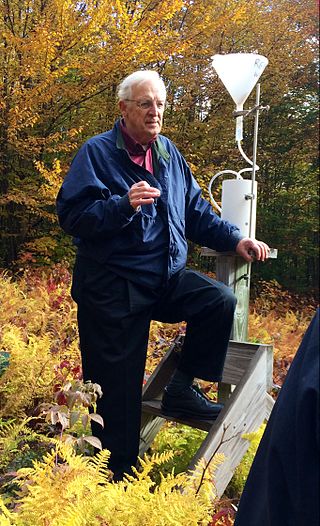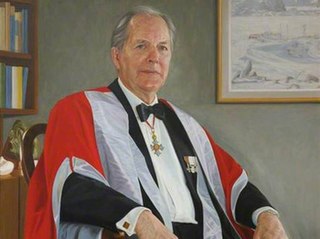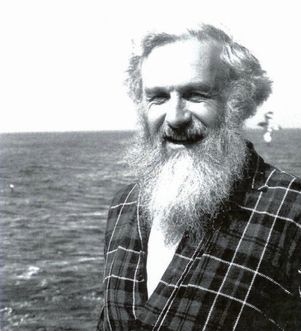Related Research Articles

The snowy albatross, also known as the white-winged albatross, wandering albatross, or goonie, is a large seabird from the family Diomedeidae; they have a circumpolar range in the Southern Ocean. It is the most recently described species of albatross and was long considered to be the same species as the Tristan albatross and the Antipodean albatross. Together with the Amsterdam albatross, it forms the wandering albatross species complex. When the complex was split into four species, the English name of the nominate form was changed from wandering albatross to snowy albatross.

The Zoological Society of London (ZSL) is a charity devoted to the worldwide conservation of animals and their habitats. It was founded in 1826. Since 1828, it has maintained London Zoo, and since 1931 Whipsnade Zoo.

Wilson's storm petrel, also known as Wilson's petrel, is a small seabird of the austral storm petrel family Oceanitidae. It is one of the most abundant bird species in the world and has a circumpolar distribution mainly in the seas of the southern hemisphere but extending northwards during the summer of the northern hemisphere. The world population was estimated in 2022 as stable at 8 to 20 million birds. In 2010 it had been estimated at 12-30 million. A 1998 book had estimated more than 50 million pairs. The name commemorates the Scottish-American ornithologist Alexander Wilson. The genus name Oceanites refers to the mythical Oceanids, the three thousand daughters of Tethys. The species name is from Latin oceanus, "ocean".
Richard Kenneth Dell was a New Zealand malacologist.

Leonard Cockayne is regarded as New Zealand's greatest botanist and a founder of Western science in New Zealand.
Sir John Hartley Lawton is a British ecologist, RSPB Vice President, President of the Yorkshire Wildlife Trust, President of The Institution of Environmental Sciences, Chairman of York Museums Trust and President of the York Ornithological Club.

The grey-headed albatross also known as the gray-headed mollymawk, is a large seabird from the albatross family. It has a circumpolar distribution, nesting on isolated islands in the Southern Ocean and feeding at high latitudes, further south than any of the other mollymawks. Its name derives from its ashy-gray head, throat and upper neck.

Gene Elden Likens is an American limnologist and ecologist. He co-founded the Hubbard Brook Ecosystem Study at the Hubbard Brook Experimental Forest in 1963, and founded the Cary Institute of Ecosystem Studies in Millbrook, New York in 1983.

James William Slessor Marr was a Scottish marine biologist and polar explorer. He was leader of the World War 2 British Antarctic Expedition Operation Tabarin during its first year, 1943–1945.

Richard Maitland Laws was Director of the British Antarctic Survey from 1973 to 1987; Master of St Edmund's College, Cambridge, from 1985 to 1996 and Secretary of the Zoological Society of London.
John Edward Morton was a biologist, scholar, theologian, and conservationist from New Zealand. Trained at Auckland University College and the University of London, he became the author of numerous books, papers, and newspaper columns. Morton researched New Zealand's ecology and marine life, and was a marine zoologist. He was also the presenter of the imported nature and science television programme, Our World.

Peter John Barrett is a New Zealand geologist who came to prominence after discovering the first tetrapod fossils in Antarctica in 1967.

Sir Ian Lamont Boyd, is a Scottish zoologist, environmental and polar scientist, former Chief Scientific Adviser at the Department for Environment, Food and Rural Affairs (DEFRA) and is a professor of biology at the University of St Andrews. He is Chair of the UK Research Integrity Office and President of the Royal Society of Biology.

Diana Harrison Wall was an American environmental scientist and soil ecologist. She was the founding director of the School of Global Environmental Sustainability, a distinguished biology professor, and senior research scientist at the Natural Resource Ecology Laboratory at Colorado State University. Wall investigated ecosystem processes, soil biodiversity and ecosystem services. Her research focused on the Antarctic McMurdo Dry Valleys and its Wall Valley was named after her. Wall was a globally recognized leader and speaker on life in Antarctica and climate change.

Barbara Wienecke is a senior research scientist with the Australian Antarctic Division. She is a seabird ecologist who uses satellite tracking to investigate seabird population dynamics and ecology. Wienecke has played a key role in enhancing the quality of, and overseeing the implementation of, a number of Antarctic Specially Protected Area management plans for wildlife concentrations in East Antarctica.

Louise Allcock is a British researcher, best known for her work on ecology and evolution of the cephalopods of the Southern Ocean and deep sea. She is the editor of the Zoological Journal of the Linnean Society.
Patricia Monaghan is a British ornithologist who is Regius Professor of Zoology in the School of biodiversity, one health & veterinary medicine at the University of Glasgow.
Sarah Wanless is a British animal ecologist. She is an expert on seabirds; she is a Fellow of the Royal Society of Edinburgh and is Honorary Professor at the Universities of Glasgow and Aberdeen.
Jane Reid is an evolutionary ecologist from the UK, she is International Chair Professor at the Norwegian University of Science and Technology (NTNU) in Trondheim, Norway and is also Professor of Population & Evolutionary Ecology at the University of Aberdeen.

William Nigel Bonner was a British zoologist, Antarctic marine mammal specialist, author and ecologist. The topics of his books and scientific publications included marine animals, reindeer and the ecology of the Antarctic. He headed the Life Sciences Division of the British Antarctic Survey from 1974 to 1986, and served as deputy director from 1986 to 1988. Bonner received the Polar Medal in 1987, in recognition of his work in Antarctica.
References
- ↑ http://www.debretts.com/people/biographies/browse/c/25388/John%20Patrick+CROXALL.aspx [ dead link ]
- ↑ "About - British Antarctic Survey". www.antarctica.ac.uk. Archived from the original on 7 July 2015. Retrieved 7 December 2011.
- ↑ "Search Results for "1" – Pacific Seabird Group". www.pacificseabirdgroup.org.
- ↑ Croxall, John (1971). Digestive system, feeding and ecology of some New Zealand intertidal ascidians (Doctoral thesis). ResearchSpace@Auckland, University of Auckland. hdl:2292/772.
- ↑ "Archived copy" (PDF). Archived from the original (PDF) on 4 March 2016. Retrieved 7 December 2011.
{{cite web}}: CS1 maint: archived copy as title (link) - ↑ "Winners of our President's Medal".